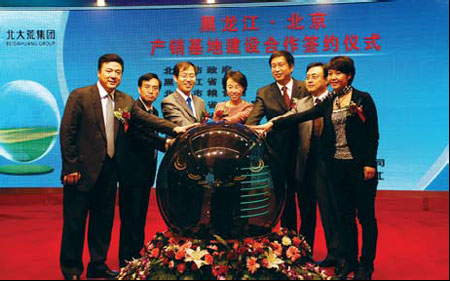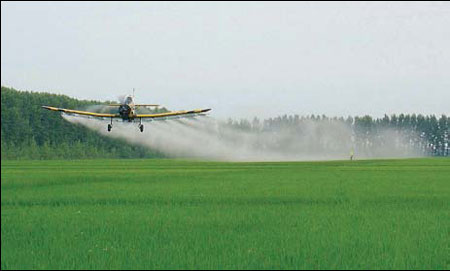Revolution based on agricultural mechanization
Updated: 2011-10-12 08:01
By Zhou huiying (China Daily)
|
|||||||||||
|
The Beidahuang Rice Industry Group and Beijing Grain Bureau sign a contract, on Sept 20, for 30,000 tons of rice, and a food production and marketing project that connects Heilongjiang and Beijing. |
|
Low-flying aircraft applies aerial spraying techniques to crops. |
The broad swath of rice paddies and farmland stretching out towards the horizon has become quite a common sight on the vast plains of Heilongjiang province in China's Northeast.
It doesn't matter whether you're walking around in Mudanjiang or on a farm on the Sanjiang or Songnen plains, there are harvest scenes to be found everywhere.
And the large area and high yields of the Heilongjiang Agricultural Reclamation Zones (HARZ) areas over the past several years have put them out in front.
It took only two years to raise the annual grain production of HARZ from 15 billion kilograms to 20 billion kg, or enough to feed 100 million people.
And the thing that has made this farming revolution possible is the big agricultural machinery.
They can be seen, for example, sitting out there in the parking area of Farm 857, where Liu Qinghua's model 3316 combine is just waiting to get started.
Liu is the head of one part of the farm and owns 15 farm machines in all, including one for planting and another for spreading fertilizer.
"This zone has seen the complete mechanization of everything, from planting to reaping," said Li Jun, director of the zone.
The head of the Heilongjiang Agricultural Machinery Bureau, Li Jun, explained that the modern machinery has changed the agricultural situation completely, improving farmers' lives and allowing them to deal with natural disasters.
The powerful machines can help protect farmland for rice and wheat growing by loosening the soil deeper and turning the straw under. In that way, the soil can be protected from droughts and floods.
The machines also have an advantage in the race against time, while saving labor, making work more efficient, and keeping costs down.
Wheat planting now takes no more than five days, shaving 10 days off the traditional method.
Soybean and corn planting takes no more 15 days, or 10 days less than it used to. Modern agricultural machinery has become the main symbol of agricultural technology advances.
In 2011, the province spent 1.8 billion yuan on new agricultural equipment, adding more than 50,000 machines. Now, nearly 97 percent of the farm zones are mechanized.
Technology gives industrialization a boost
In speaking about this year's especially impressive harvest, Liu Aiguo, the head of another area of Farm 857, gets emotional: "There are no shortages, and there shouldn't be any, not even a little bit."
Since last autumn's harvest, the level of standardization has remained high - from the sprouting of seedlings and rice planting by machine to the homework and management of the fields - and the farm zones adhere strictly to the "three standardizations".
This year, the farms did a bit of innovating, with the focus on 10 cultivation methods and 10 new technologies. These include water-saving irrigation methods, intelligent seedling production, and accelerated corn germination.
The application of new farm machinery was improved through 10 new technologies which included soil conservation and GPS navigation.
More rice, corn and soybean fields were added and higher production was given a key role, with new plant varieties.
The use of more integrated cultivation and technological methods has allowed the zones to go from traditional methods to agricultural industrialization.
Leading the way to healthy food
The Beidahuang Rice Industry Group and Beijing Grain Bureau signed a contract on Sept 20, for 30,000 tons of rice, and a food production and marketing project that connects Heilongjiang and Beijing.
By the end of the 12th Five-year Plan (2011-2015), the Beidahuang group is expected to build as many as eight grain production bases and a supply channel for one million tons of rice.
"By cooperating with Beidahuang, there will be no problem with food security in Beijing," explained Cheng Hong, the city's deputy mayor.
Beidahuang's rice has become a preferred commodity among China's exports, prized for its quality and competitive price.
"Every rice processor will provide an invoice with the farmer's name, ID number, and address. If there's a problem, we can trace it back to the source and can facilitate a recall without delay," said Liu Jun, the general manager's assistant at Beidahuang.
The group's rice has become popular with consumers and has been given the "China Renowned Brand" award and "Most Competitive brand" award, and the "Beidahuang" brand has been given the "Chinese Famous Brand" award.
(China Daily 10/12/2011 page7)

